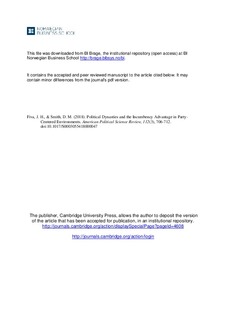| dc.contributor.author | Fiva, Jon H. | |
| dc.contributor.author | Smith, Daniel M. | |
| dc.date.accessioned | 2019-03-20T09:25:42Z | |
| dc.date.available | 2019-03-20T09:25:42Z | |
| dc.date.created | 2018-08-29T11:23:29Z | |
| dc.date.issued | 2018 | |
| dc.identifier.citation | American Political Science Review. 2018, 112 (3), 706-712. | nb_NO |
| dc.identifier.issn | 0003-0554 | |
| dc.identifier.uri | http://hdl.handle.net/11250/2590768 | |
| dc.description.abstract | A handful of recent studies have investigated the causal effect of incumbency on dynasty formation in candidate-centered electoral contexts. We use candidate-level data and a regression discontinuity design to estimate the incumbency advantage and its relation to dynasty formation in the party-centered, closed-list, proportional-representation setting of Norway. The results indicate that the incumbency advantage exists even in this party-centered environment; however, in contrast to recent findings for the United States and the Philippines, we find no evidence that incumbency is important to the formation of dynasties. This finding underscores the need for more research into the role of internal party organizational networks in the perpetuation of political dynasties. | nb_NO |
| dc.language.iso | eng | nb_NO |
| dc.publisher | Cambridge University Press | nb_NO |
| dc.title | Political dynasties and the incumbency advantage in party-centered environments | nb_NO |
| dc.type | Journal article | nb_NO |
| dc.type | Peer reviewed | nb_NO |
| dc.description.version | acceptedVersion | nb_NO |
| dc.source.pagenumber | 706-712 | nb_NO |
| dc.source.volume | 112 | nb_NO |
| dc.source.journal | American Political Science Review | nb_NO |
| dc.source.issue | 3 | nb_NO |
| dc.identifier.doi | 10.1017/S0003055418000047 | |
| dc.identifier.cristin | 1605209 | |
| cristin.unitcode | 158,3,0,0 | |
| cristin.unitname | Institutt for samfunnsøkonomi | |
| cristin.ispublished | true | |
| cristin.fulltext | postprint | |
| cristin.qualitycode | 2 | |
